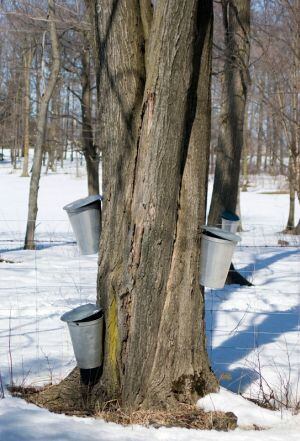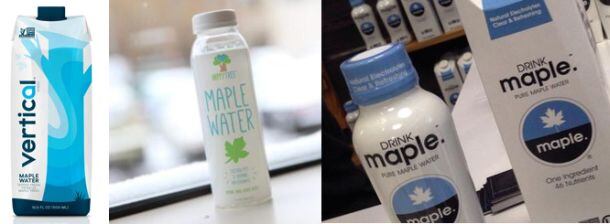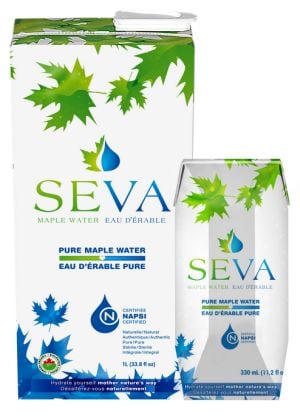SEVA chief executive Denis Normandin was speaking to FoodNavigator-USA after we ran an article covering efforts by the International Maple Syrup Institute (IMSI) to establish a uniform standard of identity for maple water beverages.
In the article we spoke to US-based companies including DRINKmaple and Vertical Water, who believe that ‘maple water’ should refer exclusively to the nutrient-rich, slightly sweet sap tapped directly from maple trees; and not to permeate, the water filtered off the sap via reverse osmosis during maple syrup production; or any other maple-related products.
Others, however, argue that it is perfectly reasonable to call RO permeate ‘maple water’, as it does come from maple trees.
US and Canadian maple sap companies both agree that we have to make it clear to consumers that pure maple sap water is very different to RO permeate
SEVA products are certified by a scheme called NAPSI - set up by the Federation of Quebec Maple Syrup Producers – that provides reassurances to consumers that they are getting sap tapped directly from maple trees that meets certain quality standards – as opposed to RO permeate, or any other product, said Normandin.

However, while SEVA and other Canadian brands such as OVIVA and WAHTA are NAPSI certified, the scheme only covers products made from maple sap tapped in Quebec, so is not open to companies who produce maple sap water from trees growing in Vermont or New York, for example.
He added: “But what I would say is that US and Canadian maple sap companies both agree that we have to make it clear to consumers that pure maple sap water is very different to permeate, which is basically just demineralized water. I’m going to be attending the meeting on Friday and I think we are all on the same page on this.
“It’s confusing for buyers and for consumers when permeate is being sold as ‘maple water’, so we must as an industry work out acceptable terms for maple sap products and permeate products.”
While one solution would just be to re-label products such as SEVA and DRINKmaple as 'maple sap' - a term well understood in some other countries- consumers in North America had become accustomed to calling maple sap 'maple water', so this was not a solution, he said.
NY meeting will bring key stakeholders together
His comments came ahead of a May 15 meeting of the maple water committee of the IMSI, which is getting key players around the table to discuss the options.
In an email to attendees, IMSI executive director Dave Chapeskie said: “The latest products emerging in the marketplace are beverages derived from real maple – maple sap, RO permeate water, maple syrup water and combinations of these… There is great potential for growth and care must be taken to establish appropriate identity and quality standards.”
The Federation of Quebec Maple Syrup Producers is represented on the IMSI maple water committee, and the provisions in NAPSI will be "carefully considered when we further discuss definitions & standard of identity", Chapeskie told FoodNavigator-USA.
The purpose of the IMSI initiative is threefold, he added:

- To determine criteria for maple sap and other beverages derived from it, and to develop a uniform definition for products that fall within this category;
- To develop a food quality and safety protocol for the above category;
- To develop recommendations on the labeling of maple sap water products in the retail and wholesale market.
Should the word ‘sap’ be optional or required in the product name?
In a questionnaire sent to stakeholders ahead of the meeting, they were asked:
- Should the word ‘sap’ be optional or required in the product name? (eg. Pure Maple Sap Water)
- What should the lowest acceptable sugar content be?
- What should the highest acceptable sugar content be?
- Should adjusting of sugar content be allowed by adding either RO concentrate or RO permeate?

They were also asked about a draft standard of identity for RO permeate, the distilled water filtered off from maple sap by reverse osmosis (RO) during maple syrup production, in which most of the water in the sap is removed before it is boiled to create maple syrup.
During the RO process, the sap is forced under pressure across membranes with pores small enough to restrict the passage of sugar and minerals, but large enough to allow water molecules to pass through.
Recipients were asked: Do the following statements accurately describe to the consumer what the product is?
- Demineralized and Sugar Free Maple Tree Water? This is permeate directly from the R.O. (YES/NO)
- Mineralized Maple Tree Water? Minerals are added for safe continuous drinking. (YES/NO)
They were also asked whether the term ‘maple beverage’ might be appropriate to describe products other than maple sap or RO permeate (eg. diluted maple syrup, maple soda or carbonated maple syrup); and whether beverages with artificial maple flavor added should have the term ‘flavored’ displayed prominently on pack, and be banned from describing themselves as ‘maple water’.

The biggest challenges are education and logistics
So how is SEVA – which first hit shelves in 2013 and markets itself as ‘Pure Maple Water’ on front of pack - doing?
Business is growing, said Normandin, with SEVA products now sold in 12 countries and more than 2,000 locations, but it is still a new category, and retail buyers, as well as consumers, need educating about what maple water/sap is, and just as importantly, what it isn’t.
So what will determine the winners and the losers in this embryonic market, which now boasts multiple brands including SEVA, WAHTA, OVIVA, MAPLE3, Happy Tree (HPP rather than UHT), Vertical Water, DRINKmaple, and Necta?
The ability to build an efficient supply chain, and to market your product the most effectively, he said.
“The biggest challenges are logistics and education, but I think the potential is there. It’s a pure, simple natural product that nourishes and hydrates and it’s very low in calories.”
